Neurobiology on sugar: "It's even worse than you think"
I ate so much sugar during the last couple of weeks that I need a break and a big one. I think it is going to last until February until those "European carneval donuts" become popular again. My addiction to them is one of the reasons February is such an awesome month. Since I am going on a break until then and giving my body some well-deserved sugar break, it is important to remind myself (and you) what sugar is doing not only to my body but to my brain too.
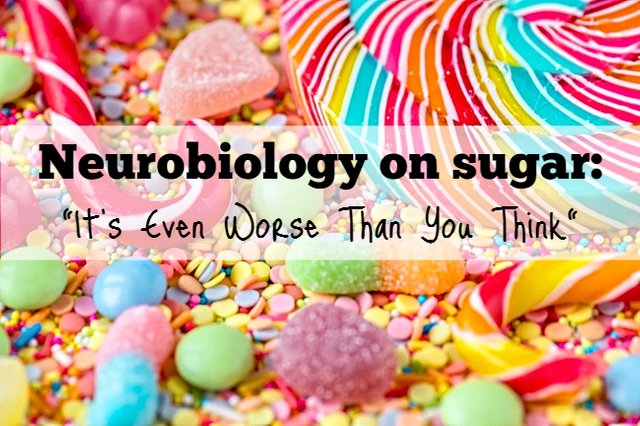 CC0 image, Unsplash, author: rawpixel
CC0 image, Unsplash, author: rawpixel Some exercising is in order too because all that sugar somehow magically transformed to fat, all of it. My genetics has once again shown who is the boss in our little relationship and there is going to be some serious workouts if I want to get back in shape again. This kind of article might just be the motivation I need. Hopefully, it will help you too.


First of all, there is a huge difference between natural sugar that is found in fruits and vegetables and added sugar that is, well, added to foods that would not normally have it. Added sugar is one of the main ingredients in candy, processed foods, soft drinks, and baked products. Yes, there is sugar in even the bread. It is everywhere. According to the American Heart Association, the amount of added sugar you should eat per day is 150 calories (37.5 grams) if you are a man and 100 calories (25 grams) if you are a woman. Here comes the plot twist, one regular-sized Snickers bar contains 120 calories from sugar. The math is simple, we are screwed.
The biggest problem lies is high-calorie beverages that do not make us feel full when we have them as we would if we took the same number of calories in food and keep in mind that those calories do not include fiber and other important nutrients from food. When we drink sugary drinks, our bodies respond to that sugar by producing triglycerides and some of them get stored in the liver while others get exported into the bloodstream. Research has suggested that our bodies process liquid sugar differently than sugar in foods. The lack of fiber makes the journey from liquid sugar to blood sugar much faster
You should be careful with sugars because unlike salt and fats that are added to foods, not all nutrition labels provide you with a daily reference value. If you skip that homemade cake, there is still lots of sugar in the rest of your food. Manufacturers add sugar to more than 70% of packaged foods that are sold in supermarkets. There are more than 60 names for sugar you can look for listed on packaging such as sucrose and high-fructose corn syrup, barley malt, dextrose, maltose, rice syrup, etc.


Consuming too much added sugar over long periods of time affects the natural balance of hormones in the body. Levels of glucose in the bloodstream get increased which leads the pancreas to release insulin. Those higher levels of insulin cause the body to store more food calories as fat and they also affect a hormone leptin. Leptin is important because it is our natural appetite suppressant. It tells the brain we are full and should stop eating. High consumption of certain sugars has been linked to leptin resistance where the brain no longer gets the message that a person is full which leads to weight gain and obesity. To make things even worse, those with leptin resistance feel sluggish and it is more difficult for them to be active which continues the weight gain.
Addictive properties are scary similar.
When we eat too much sugar, it leads to chemical changes in the limbic region of our brain (reward center) and characteristics of craving and withdrawal are produced just like with any other addictive substance. Yup, that's right, most of us are addicted to sugar and not even aware of it. Scientists at the U.S. National Institute on Drug Abuse were first to show that sugar causes changes in peoples' brains that are similar to those in people addicted to drugs. There is plenty of research now on the potentially addictive properties of sugar. You can check one of those here:
Evidence for sugar addiction: behavioral and neurochemical effects of intermittent, excessive sugar intake by Avena NM, Rada P, Hoebel BG.
The research confirms the presence of neural adaptations including changes in dopamine and opioid receptor binding, enkephalin mRNA expression and dopamine and acetylcholine release in the nucleus accumbens. Too much sugar can lead to cravings and even MRI scanners showed how the same areas of the brain are activated when people crave either junk food or drugs. When the brain gets flooded with dopamine, a protective mechanism starts and the brain reduces its number of dopamine receptors (downregulation). This produces tolerance and like with any drug, a person needs progressively larger and larger doses. This is why I urge you to check these studies too:
Natural Rewards, Neuroplasticity, and Non-Drug Addictions by Christopher M. Olsen, Ph.DSucrose sham feeding on a binge schedule releases accumbens dopamine repeatedly and eliminates the acetylcholine satiety response by Avena NM, Rada P, Moise N, Hoebel BG
Keep in mind that sugar addiction is diagnosed based on a set of behavioral symptoms and the official criteria used by medical professionals is called DSM-V. Some of the symptoms include the inability to cut back despite wanting to, cravings and urges, physical problems, guilt, excuses, hiding from others etc.


There was a study by Duke University researchers that showed how a sugar habit changes specific brain circuits which produced cravings that reinforce the habit. A vicious circle indeed. They got a group of healthy mice hooked on sugar and compared the brains of the sugar-dependent mice to another group of healthy mice not hooked on sugar, focusing particularly on basal ganglia. That brain network is traceable along two main pathways: the first one that carries a “go” signal which triggers action to pursue the object of the addiction and the second one that carries a “stop” signal which puts the brakes on the pursuit.
Not only did the mice addicted to sugar have a more active go and stop signals but the go signal consistently appeared before the stop signal. Their brains lost the braking capacity to regulate their behavior. The brain circuitry changes were so strong that the researchers could predict which mice became hooked on sugar just by examining samples of their brains. Changes in their brains produced a strong signal to get more sweets and the mice continued pursuing sugar even when it was gone portraying a craving behavior. You can read the full study here:
EPathway-Specific Striatal Substrates for Habitual Behavior by Justin K. O’Hare, Kristen K. Ade, Tatyana Sukharnikova, Mark L. Palmeri, Henry H. Yin, Nicole Calakos
The problem with sugar is that it produces the same addictive behavior like alcohol or drugs but is still not considered as dangerous as those substances because a person addicted is not damaging to her surroundings like alcoholics or drug abusers. Unfortunately, society still turns a blind eye to those addictions that are damaging only the addicted person and not the people around her.


According to a study funded by the National Institutes of Health, fructose may be doing a widespread of damage to our genes. More than 20,000 genes were examined to find if they get affected by fructose which results in changes to brain function and metabolism. More than 200 genes in the hippocampus and 700 in the hypothalamus are sequenced. According to Xia Yang, co-senior author of the study and a UCLA assistant professor of integrative biology and physiology, “Parkinson’s disease, depression, bipolar disorder, and other brain diseases” are all potential outcomes from gene disruptions caused by fructose.
Previous research already found that fructose increases levels of toxic molecules in the brain that damage communication between cells but now the UCLA researchers reported that they were able to identify the mechanism by which they were damaged. It is done by altering one of the four nucleotides that make up DNA. Diets high in fructose trigger the genes’ “on” or “off” switch, altering their function. Remember the on and off thing from the previously mentioned research? Yup, that's it. They had a control group that drank only water and one that drank water with fructose. The rats were then trained to run a maze, and the results showed that it took the fructose-consuming group twice as long to navigate the maze as the water-only group despite the same level of training which indicates impaired memory. The fructose rats had higher blood glucose, triglycerides and insulin levels. You can read the studies here:
‘Metabolic syndrome’ in the brain: deficiency in omega-3 fatty acid exacerbates dysfunctions in insulin receptor signalling and cognition by Rahul Agrawal and Fernando Gomez-PinillaSystems Nutrigenomics Reveals Brain Gene Networks Linking Metabolic and Brain Disorders by Qingying Meng, Zhe Ying, Emily Noble, Yuqi Zhao, Rahul Agrawal, Andrew Mikhail, Yumei Zhuang, Ethika Tyagi, Qing Zhang, Jae-Hyung Lee, Marco Morselli, Luz Orozco, Weilong Guo, Tina M. Kilts, Jun Zhu, Bin Zhang, Matteo Pellegrini, Xinshu Xiao, Marian F. Young, Fernando Gomez-Pinilla, Fernando Gomez-Pinilla, Fernando Gomez-Pinilla, Xia Yang
Even though experiments that I was talking about were conducted on rats and more research is needed, the majority of the sequenced genes are comparable to those in humans and we can conclude how all of these findings hold a great value to our understanding of fructose and added sugars in our diet.
My advice? Avoid it.
Yeah, yeah, I know, it is delicious, you do not have to tell me. I am well aware of how amazing some things taste and am struggling to avoid it myself. The problem is, we all fail as soon as we start because we avoid those things that are obviously filled with sugar such as cakes, cookies, and chocolate but continue drinking sodas and juices and eating processed foods. Whenever you see a label "light" or "low-fat" on your food, read the ingredients, it always has more sugar. We have become more conscious about fats than we are on sugar and often forget how it is hiding in plain sight.
You should always choose whole fruit instead of fruit juice, avoid sugar-sweetened beverages, limit your consumption of sweets and refined carbohydrates, eat fresh fruits instead of those canned in syrup and start being creative in the kitchen. Have you heard of stevia? Look it up, you may be surprised by what you find. Remember that if something has a sticker on it that says "healthy" it may not be, the creator of that product wants you to buy it so be careful and READ the packaging. If there is sugar in the first 3 listed ingredients (any of its names) or if there is more than one type of sugar in it, it is safe to say that you should avoid it.
If you are interested in learning more on this subject, check out these REFERENCES:Over time, too much liquid sugar can lead to serious diseases from ucsf.edu
Added sugar is hiding in 74% of packaged foods from ucsf.edu
Too much fructose can damage your liver, just like too much alcohol from ucsf.edu
Dietary Sugars Intake and Cardiovascular Health-A Scientific Statement From the American Heart Association from ahajournals.org
The growing concern over too much added sugar in our diets from cell.com
10 Similarities Between Sugar, Junk Food and Abusive Drugs from healthline.com
Why Breaking Habits Is Even Harder Than We Think from forbes.com
Diets Heavy In Fructose Damage Genes Related To Memory And Metabolism, Says Study from forbes.com
Daily Intake of Sugar — How Much Sugar Should You Eat Per Day? from healthline.com

Until next time,
KEEP YOUR SMILE ON!
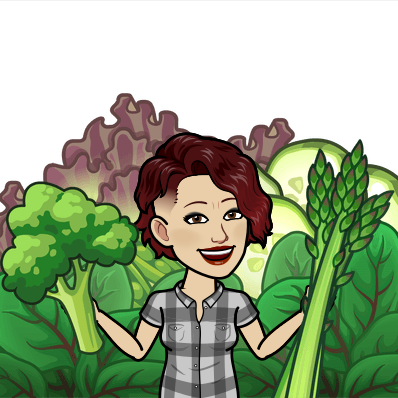


Image sources AND LICENCES in order of appearance:
- all images used in this post are free for commercial use, they are royalty free with the links to original images provided under them
- titles are made with the CC0 image from Pixabay that can be found here
- line divider that I use is from FREE CLIPART LIBRARY, and is here
- my bitmoji avatar was created on https://www.bitmoji.com/, visit the site to create yourown
PROUD MEMBER OF:

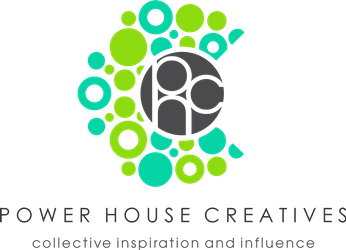



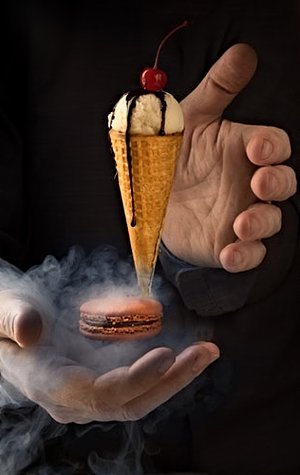
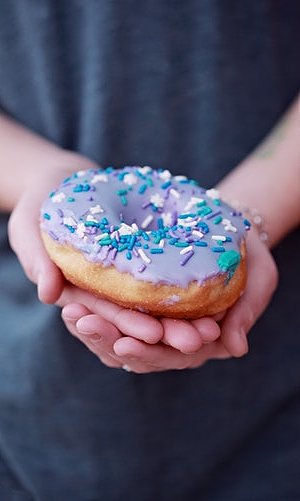
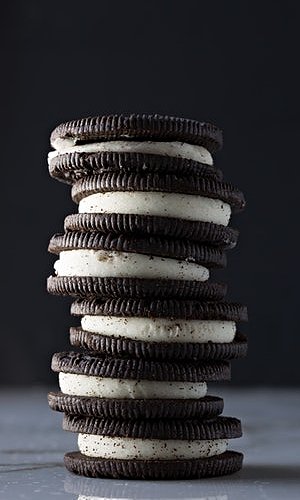


This post has been voted on by the SteemSTEM curation team and voting trail in collaboration with @utopian-io and @curie.
If you appreciate the work we are doing then consider voting all three projects for witness by selecting stem.witness, utopian-io and curie!
For additional information please join us on the SteemSTEM discord and to get to know the rest of the community!
Thank you for your amazing and continuous support that always motivates me to do more 💚
I dread to imagine how much Sugar I used to take in when I was bad for drinking Sodas, I think since giving them up I do not have to much sugars at all, other that when I visit the kids and grandkids when buying donuts is a habit we do but onoly one or two over. Along weekend isnt to bad but they are just to hard to resist
Oh yeah, donuts are one of my guilty pleasures and when I start, there is no stopping me hahahaha. That is why I have cut back now because I know February is all about donuts in my country :)
Those February ones do sound interesting and same for me donuts are so hard to resist
Have a great day
It is scary just how damaging sugar can be to your body. I have had to conciously cut it out because I keep having dizzy spells after I heat refined sugar. I know use honey in my porridge and some hot drinks and where only sugar would normally do, I have replaced it with canderel which is fine once you get used to it. the funny thing about sugar is just how addictive it can be! Once you start having it, you crave it even more! After about a week of no sugar (except natural sugars) I didn't crave it at all! In fact my usual sweet tooth, seems to have all but disappeared!
Great article, as always! :D
Cheryl xx
I have found that COCOA and natural sugars from fruit help when you are trying to get that addiction off you back. I am happy to hear you found your substitute and it works for you and good job for doing it in only a week!
Great article!!
Wow! I mean, I knew sugar was bad. We ALL know sugar is bad. I am very aware of its affects on our immune system! The more sugar you eat, the more difficult it is for our bodies to fight germs.
I didnt really know about all the scientific reasons for all the subtle things it is doing in our bodies and in our brains though! Thanks for the brain food!
Yup, I was surprised with what it does to our brains too. It just shows how our entire body is at risk from it. Thanks for the feedback! 💚
I'm the worst sweet tooth ever, I know it's bad for me but cannot resist it especially buttery caramel toffees!!! I really must start cooking and baking like @birdsinparadise, she never uses sugar! I know it's an addiction and must heed this warning! Excellent post as always @zen-art.
I wish you all the best with cutting sugar from your recipes, I know it can be really hard. 💚
We use brown sugar or honey or maple syrup when possible. The less refined a sugar is, the less harmful. It's still sugar but more tolerable. Most calorie-free sweeteners are equally bad. I have heard good things from a lot of people about stevia. The absolute worst sweetener, I believe, is high fructose corn syrup.
This excellent post was included in our new curation effort The Magnificent Seven -- a collaborative work by @enchantedspirit and @catweasel. You have received a 100% upvote from each of us to show our appreciation for your post. To see your creation showcased here ... and the fine company you keep ... please visit this link.
We appreciate your support both for our work on this project and for the other creators of exceptional content who make it all possible. (Follow @catweasel to catch our future Magnificent Seven posts. @enchantedspirit says I'm really not as annoying as you might think, but she doesn't mean it.)
Thanks for the reminder. I'm pretty good about staying away from sugar, and I sure notice when I forget. Last time I got sick, I believe the final straw was caving in and having dessert—it lowers the immune function for sure.
The good news about stuff like this is every time we eat, we have a new chance to make better choices. Crucial not to beat ourselves up for making mistakes, but keep moving forward and do the best we can. Good luck with those workouts. ;)
Mistakes are part of life and great learning opportunities. Yes, as long as we move forward, we will be fine. Thank you for your lovely words 💚
I want to shout this from the rooftops. In fact I've written about this subject myself (when I first joined Steemit and had barely any upvotes!) - and it's great to read more scientific research on the subject. I have weaned myself off sugar in the past, with enormous difficulty, and I just become addicted again.
The one thing I disagree with is that we should "only" consume 25g of added sugar a day. No. We should not eat any added sugar! The human race evolved without any added sugar for hundreds of thousands of years before refined sugar came along! It serves no purpose except to make us fat and sick!
I say this as a total hypocrite - I'm addicted to the stuff.
Ugggghhhh. I do so good about 6.8 days per week :) I go to a meeting on Monday morning that always features donut holes. I just can't seem to let them be...
I quit on sugar several years ago. I don't have a grain of sugar in my house, if you come to visit and need sweetener in your coffee it's going to be honey or Steevia. I haven't bought a loaf of bread or even a donut in most of a year. But those Monday donut holes trigger my addiction something awful.
I'm going to have to try a substitute. I come home from the meeting and am lethargic and sleepy for the rest of the day. What a waste.
Thanks Petra. I certainly didn't need all the studies to let me know about my cravings but it didn't hurt anything.
6.8 is better than me, soooo much better. I am so bad when it comes to avoiding sugar and I need to be reminded constantly that it is bad for me. My head starts hurting and I really get nasty mood symptoms. I just have to stick it out because after a couple of first days things get better but those first days without it are a real pain in the .... :D
Good post, the real gateway drug....Sugar!
Doing my yearly 60 day cleanse of all sugar and starches soon here, feels so good.